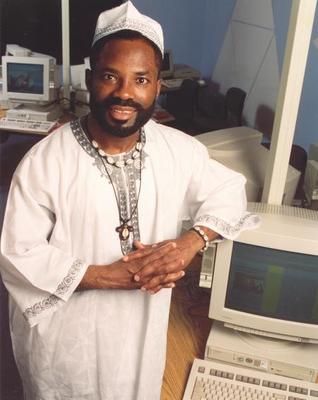THE SUPER COMPUTER GENIUS OF OUR TIME

THE SUPER COMPUTER GENIUS OF OUR TIME
(Above picture shows Philip Emeagwali in our traditional African royal regalia.)
Who is the most respected
Super Computer genius from Africa?
A billion dollar guess?
But all the search engines will only come up with the name of PHILIP EMEAGWALI!
The 48 years old super computer genius from Nigeria.
Here is an interview with this highly gifed Super Computer Genius of our time.
Interview with Philip Emeagwali.
Part 1: Early Life of Philip Emeagwali - Supercomputers
Interview By Mary Bellis.
Nigerian born Dr. Philip Emeagwali first entered the limelight in 1989 when he won the prestigious Gordon Bell Prize for his work with massively parallel computers. He programmed the Connection Machine to compute a world record 3.1 billion calculations per second using 65,536 processors to simulate oil reservoirs. With over 41 inventions submitted to the U.S. Patent and Trademark Office, Philip Emeagwali is making big waves in the supercomputer industry, amazing achievements only surpassed by an even more amazing life.
About Nigeria, how do you envision your beginning affecting your end?
Philip Emeagwali - Nigeria is a West African nation of over 100 million energetic people. It is endowed with lots of natural resources but lacks human resources. It was recently ranked by the World Bank as the 13th poorest nation in the world. Due to financial reasons, I dropped out of school after eight years of formal schooling. During 1967-70 period, my family was homeless. Sometimes, we slept in refugee camps, abandoned school buildings and bombed houses.
The hardship of living in a refugee camp made me psychologically strong. It is called learning from the school of hard knocks. It made me street smart. It equipped me with a greater sense of determination and vision.
Adversities such as being homeless and going to prison has made many people stronger. Nelson Mandela and Malcolm X came out of prison stronger. The hardships that I encountered in the past will help me succeed in the future.
You speak about the influence nature's own creativity has had upon your science theories, how did this begin?
Philip Emeagwali - I have expertise in five different fields which helps me to easily understand the analogy between my scientific problems and those occurring in nature. First, I identify an analogous problem in nature and borrow from it. It is smarter to borrow from nature than to reinvent the wheels.
Your education during your teenage years was outside of the school system, can you talk about that experience?
Philip Emeagwali - It was the toughest experience of my life. I dropped out of high school four times between the ages of 12 to 17. When I enrolled in college at age 19, I had a total of eight years of formal classroom education. As a result, I was not comfortable with formal lectures and receiving regular homework assignments. I preferred to study those subjects that were of interest to me.
I learned by reading the classic but out-of-date works of Galileo, Isaac Newton, Bertrand Russell and Albert Einstein. Since there were no formally trained scientists in my hometown, the famous commercial city of Onitsha, I gained a word-of-mouth reputation as an expert in mathematics, physics and astronomy and students came to consult me in these subjects.
What brought about you leaving Africa?
Philip Emeagwali - I wanted to become a mathematician, physicist or astronomer. I could not study these subjects at the cutting-edge level in Africa. During the week that I arrived in the United States, I saw an airport, used a telephone, used a library, talked with a scientist, and was shown a computer for the first time in my life.
Today, I have access to a $55 million super computer while many African scientists do not have access to a personal computer. The greater opportunity enabled me to make important discoveries and inventions.
Continue interview > Philip Emeagwali on winning the Gordon Bell Award and making supercomputers.

Comments